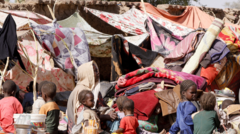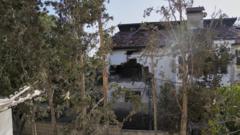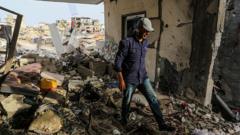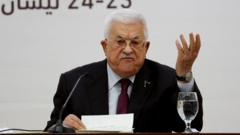The UN's World Food Programme has announced that it has exhausted its food supplies in Gaza amid an ongoing Israeli blockade, raising alarms about rising malnutrition rates and worsening conditions for Palestinians dependent on aid. Community kitchens are struggling to meet the needs of those displaced by conflict, while the international community calls for an urgent resolution to the crisis.
Humanitarian Crisis Deepens in Gaza as UN Food Supplies Run Low

Humanitarian Crisis Deepens in Gaza as UN Food Supplies Run Low
The World Food Programme issues a grave warning about food shortages as humanitarian aid is blocked by Israel, leaving millions on the brink of starvation.
The World Food Programme (WFP) has reached a critical point in Gaza, announcing that it has run out of food supplies after weeks of a stringent Israeli blockade on humanitarian aid. As Israel continues its blockade, initiated on March 2, the situation for the 2.1 million Palestinians in Gaza has grown increasingly dire, with the WFP warning that community kitchens providing hot meals may soon cease operations due to a lack of food.
In a statement issued on Friday, the WFP confirmed that its last remaining food stocks were delivered to hot meal kitchens across Gaza, which serve around one million meals each day. However, these kitchens are expected to deplete their resources within days. Israeli forces resumed their military operations following a collapse of a two-month ceasefire aimed at negotiating for the release of hostages, leaving Palestinians in dire need.
According to the United Nations, Israel has obligations under international law to allow food and medical supplies into Gaza, yet the Israeli government disputes this claim, insisting that humanitarian conditions are being met. During the blockade, food prices have reportedly surged by up to 1,400%, causing severe economic strain on families. The situation has led to a notable uptick in cases of acute malnutrition, particularly among children.
Amid humanitarian efforts, food parcels previously distributed to families have already been depleted, and more than 80 cases of acute malnutrition were identified among children screened in northern Gaza—a doubling from prior weeks. Medical facilities are overwhelmed, with shortages of both medicine and medical supplies exacerbating the conditions for those injured by ongoing bombings.
Dr. Tedros Adhanom Ghebreyesus, director-general of the World Health Organization, characterized the situation in Gaza as “awful and grim,” demanding an end to the aid blockade. He joined calls for the reopening of borders to facilitate the flow of much-needed aid and to prevent further deterioration in food security.
The WFP highlighted that the current blockade is the longest Gaza has faced and that the resultant crisis has unraveled previous progress made during the short ceasefire. More than 116,000 tonnes of food aid are reportedly positioned and awaiting delivery, contingent upon the reopening of Gaza's borders.
Antoine Renard, WFP Country Director, emphasized the urgency of the situation, noting that over 80% of Gaza's population has been displaced due to ongoing conflicts. “These kitchens are essential for people to have a basic meal,” he stated, underscoring the community's reliance on these services. In light of dwindling supplies, residents are resorting to extreme measures such as bartering goods and begging, marking unprecedented levels of desperation.
The Israeli foreign ministry, in response to international criticism regarding the blockade, maintained that aid has been sufficiently provided during ceasefires, disputing claims of an aid shortage. Tensions continue as Hamas and Israeli forces clash, highlighting the urgency for a diplomatic resolution to the escalating humanitarian crisis in Gaza.


















